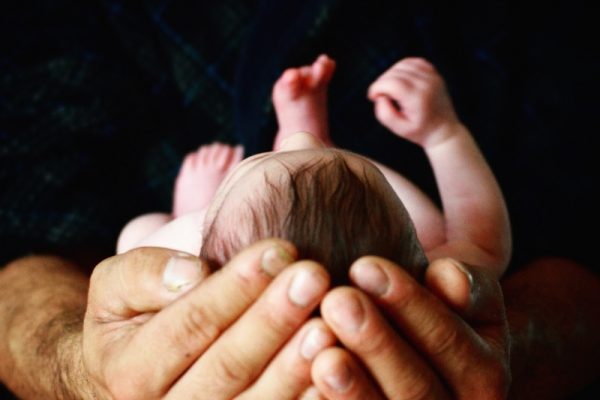Jewish Feminism’s impact on ritual reaches far beyond “feminist ritual” or “Jewish women’s rituals.” In addition to the innovations represented by new ceremonies and celebrations, Jewish feminism has substantially influenced longer-standing practices. Arguably, the entire terrain of contemporary Jewish ritual life has been in one way or another reshaped by Jewish women and men grappling with the encounter between pre-feminist traditional Judaism and Jewish feminism.
Nowhere is this impact more surprising — or more necessary — than in the case of brit milah, the ceremony and ritual of circumcision on the eighth day of a baby boy’s life. Circumcision might seem like an odd launching pad for a discussion of feminist ritual. But given that it is performed on nearly 50 percent of the Jewish population and involves parents and family, circumcision competes with the Passover seder — the holiday ritual that has drawn a waterfall of feminist attention and innovation — as the most universal Jewish practice.
The increasingly frequent simchat bat ceremony that welcomes a baby girl (a phenomenon that began in earnest in the early 1970s, notwithstanding some earlier traditions in both Ashkenazi and Sephardi communities), has influenced the conceptualization and performance of brit milah itself — arguably the most inherently non-feminist (if not anti-feminist) of rituals.
Three general categories of change in Jewish life and practice grow out of or respond to Jewish feminism; all three are reflected in the feminist impact on brit milah:
- Parallelism — the emergence of rituals, practices, and even institutions for women that mirror those traditionally for men (e.g. simchat bat, tallitot made for women, women’s yeshivot)
- Access and integration — the full and complete involvement of women in every aspect of Jewish life (e.g. female rabbis, women reading Torah and leading services)
- Transformation — the reshaping and revisioning of Jewish practice and thought, by both women and men, due to women’s involvement and in light of Jewish feminism (e.g. feminist midrash, female or gender-neutral God language)
These categories, of course, are not discrete. In the realm of ritual, for example, the emergence of the “parallel” ceremony of simchat bat has itself significantly affected the ongoing transformation of brit milah.
As simchat bat ceremonies were developed and as they flourished, their sheer (and necessary) level of creativity spilled over to — and benefited — the evolution of brit milah. While it is possible for parents to call the mohel when their son is born and simply let him execute a traditional ceremony, many parents add readings and other new forms of participation to a son’s brit milah. In large part because of the new ceremonies for girls, they have come to expect the opportunity to make contemporary additions to this most ancient of lifecycle rituals. Brit milah celebrations have also felt the impact of Jewish feminism in more revolutionary ways, both in the realms of access and integration and of transformation.
How have women made our way into this quintessentially male ritual?
The Reform and Conservative movements have trained mohalot, female ritual circumcisers. When a mohelet presides over and facilitates a brit milah, and makes the cut, she pushes her way into a line of men and boys dating back to the household of the biblical Abraham; her presence announces that brit milah is not an exclusively male realm. One or more women may hold the baby during key moments, a role highly symbolic of the chain of tradition and one until recently only filled by men. More and more often, mothers along with fathers say the blessing “…who commanded us to bring [our son] into the covenant of Abraham our father” — and sometimes, because the covenant could only continue through her child, “and Sarah our mother” — and stay close while their sons are circumcised rather than retreating to another room.
How are Jewish feminism and contemporary Jewish feminist ritual actually transforming brit milah itself?
Female God language has appeared in some brit milah ceremonies — a female God commanding circumcision — shaking up the way we view circumcision in a Jewish context. Some mothers now recite special “mother’s prayers” — contemporary in their origin, often ancient in their resonance — ritualizing their connection to this event, or offer a d’var torah (sometimes expressing deep ambivalence toward the brit milah, giving both the mother’s reservations and participation full visibility). Like the introduction of God’s femaleness into the liturgy of brit milah, positioning the mother along with the father as an actor in the ritual space of this ceremony splits open its unquestioned maleness.
Some feminists engage deeply with the question of whether to circumcise at all, reflecting both a desire to avoid inflicting unwarranted pain on their children and, on the other hand, a belief that there may be irreducible and unjustified male bias and privilege reflected in the institution of ritual circumcision. Reinterpretation of brit milah, especially if it is made manifest in the performance space of the ritual itself, changes not just what brit milah means, but what it looks like. Rabbi Elyse Goldstein provides one example:
“Since we have seen how blood offers expiation throughout the Torah, can those few drops of covenantal blood be seen as atonement for male control? As cleansing of violence in a patriarchal world?…The Jewish world has the potential to be a safe world…if it becomes a world of male sexuality defined by holiness, commitment, and responsibility. Each of my sons’ ceremonies included an acknowledgment of this new symbolism. Each baby was blessed by all the women present, holding my tallit high over him.” (From ReVisions: Seeing Torah Through a Feminist Lens, 1998)
Still, as Goldstein points out, “We need [still more] feminist midrashim, and serious feminist discussion, to lift both the ceremony and the participants above the masculinist suppositions, male exclusivity, and simple pain, that it contains.”
One final way in which Jewish feminism has made this ancient rite a contemporary ritual: Many families choose to have the circumcision part of the covenantal ceremony, the milah part of the brit, done privately, without public fanfare, decentering circumcision itself — and then welcome their baby boys publicly in a ceremony that could be used equally for boys and girls. In this way, feminist ritual comes full circle — adding simchat bat ceremonies, adding to brit milah ceremonies, transforming those ceremonies, and removing milah from the center. In the last case, public covenantal ceremonies for babies (a formal entry into a life of contemporary Jewish ritual) become — like bar and bat mitzvah — uniformly appropriate for boys and girls.
Feminist Judaism’s reshaping and transformation of brit milah is merely one sign of the depth and breadth of feminism’s impact on Jewish ritual at large.
Along with the end of Yom Kippur and the end of Shabbat (during which many contemporary Jews sing of Miriam haneviah along with Eliyahu hanavi), a bris and a Passover seder are the times in Jewish ritual life that are associated with the coming of a messianic era (and at which Elijah himself is said to appear). We are brought closer to this perfected world as we deepen, expand, and transform ancient and powerful practices at the center of Jewish life.
Used with permission from Sh’ma: A Journal of Jewish Responsibility March 2005. For additional essays on new rituals, visit www.shma.com.










